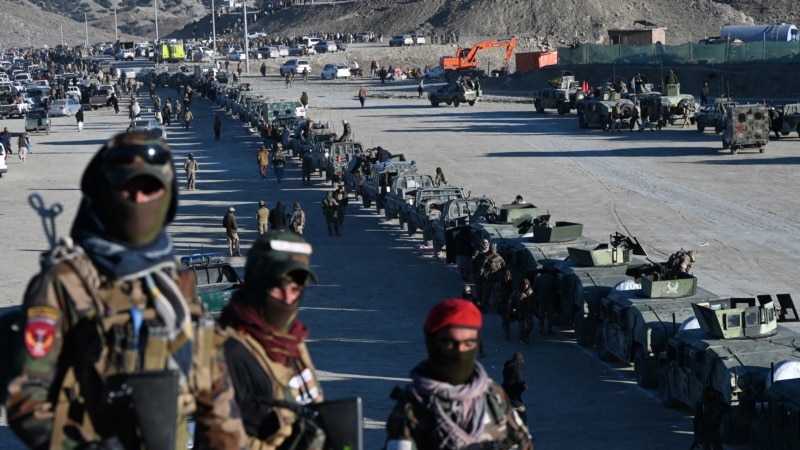
www.voanews.com
Taliban minister’s killing raises concerns about IS terror group’s expansion
ISLAMABAD — The recent assassination of a Taliban minister in Afghanistan by a local Islamic State offshoot has raised concerns about the terrorist network's expansion in the region, while signifying an escalation of the terror group’s conflict with the country’s de facto Taliban leaders.
Taliban Minister of Refugees and Repartition Khalil-Ur-Rahman Haqqani was killed, along with several staff members, in a suicide bombing while he was exiting his office in the Afghan capital on Wednesday.
Haqqani, 58, is the highest-profile target of Islamic State-Khorasan, or IS-K, since the Taliban swept back to power in August 2021. The group has so far killed at least eight high-ranking Taliban officials and prominent figures in suicide bombings. The victims include the governors of the northern Afghan provinces of Balkh and Badakhshan.
Taliban authorities have repeatedly claimed that their security operations have effectively diminished IS-K in Afghanistan, urging critics to provide evidence or stop making unfounded allegations about the terrorist group’s presence within the Afghan population.
Islamic State social media channels again derided the Taliban’s claims following Haqqani’s assassination, asserting the latest deadly attack was a testament to the group’s presence in the country and its capacity to strike at will.
The United States has refrained from immediately commenting on the deadly attack against the Taliban minister.
“The only thing I would say is that we recognize — and we said so at the time — that there was still an ISIS threat inside Afghanistan,” National Security Communications Adviser John Kirby told a White House news conference on Thursday, using an acronym for the terrorist group. “And clearly, they have set their sights on the Taliban.”
Afghanistan’s growing terror threat?
The assassination and the terrorism threat emanating from Afghanistan prominently figured in a meeting the United Nations Security Council held Thursday to discuss the situation in the crisis-ridden country.
“Terrorist forces in Afghanistan such as Daesh, al-Qaida and ETIM/TIP still pose a major threat to international peace and security,” Fu Cong, the Chinese ambassador to the U.N., told the gathering.
Fu used the Arabic acronym Daesh for the IS-K and referenced the anti-China group known as the East Turkestan Islamic Movement (ETIM), also known as the Turkistan Islamic Party (TIP).
“We call on the Afghan interim government to take counterterrorism measures to eradicate the breeding ground for terrorism and prevent Afghanistan from becoming a gathering place for terrorist organizations again,” the Chinese ambassador said.
The Russian representative, Vassily Nebenzia, addressed the meeting and highlighted Moscow’s concerns regarding Islamic State activities in Afghanistan.
“We are particularly concerned about the ongoing security risks emanating from the persistent terrorist activity of the ISIL Afghan wing,” Nebenzia said, using another acronym for the regional IS offshoot.
The Russian envoy acknowledged the Taliban’s efforts to combat the terrorist threat but characterized them as insufficient.
“We see that the fighters are enhancing their presence in the country, and they are deliberately escalating the situation, thereby recruiting new fighters, including foreign terrorist fighters, and carrying out new terrorist attacks targeting representatives of religious and ethnic minorities, including women and children,” he said.
Nebenzia went on to assert that Islamic State militants are actively attempting to establish themselves as an alternative force, thereby jeopardizing stability in Afghanistan and the broader region.
Transnational terror groups
On Thursday, the U.S. State Department’s annual country report on terrorism also underscored the threat transnational groups pose to regional stability from Afghanistan.
“Despite commitments by the Taliban that Afghan soil would be used neither to support terrorist groups nor to launch attacks against the United States or its allies, terrorist groups such as the Islamic State’s Khorasan Province (ISIS-K) and Tehrik-e-Taliban Pakistan (the TTP) continued to take advantage of poor socioeconomic conditions and uneven security procedures that make for a more-permissive operating environment,” the report stated.
“The Taliban arrested some notable ISIS-K operatives in 2023 and viewed ISIS-K as the primary threat in Afghanistan while appearing to apply less pressure against al-Qaida and TTP,” the report noted.
TTP, a globally designated terrorist group, has waged attacks against Pakistan and has intensified its cross-border raids since the Taliban seized power in Kabul.
The IS-K began its extremist operations in the region in early 2015 and mainly consisted of defectors from members of the then-insurgent Afghan Taliban and the TTP.
Despite both being ardent advocates of the strict interpretation of Islamic law known as Sharia, the Sunni-based Afghan Taliban and IS-K are notorious for their intense rivalry.
ISIS-K claimed responsibility for multiple attacks it carried out beyond the Afghan borders in 2024. The targets included a memorial service in Shiite Iran, a Moscow concert hall and a church in Turkey, collectively killing nearly 250 people.
Pakistan, while briefing the Security Council Thursday, highlighted growing TTP attacks, saying the violence is being orchestrated from Afghan hideouts.
“The TTP — with 6,000 fighters — is the largest listed terrorist organization operating in Afghanistan. With safe havens close to our border, it poses a direct and daily threat to Pakistan’s security,” Usman Iqbal Jadoon, the Pakistani representative at the U.N., told the meeting Thursday.
“We have evidence of its [the TTP’s] collaboration with other terrorist groups … to disrupt Pakistan’s economic cooperation with China. Given its long association with al-Qaida, the TTP could emerge as al-Qaida’s arm with a regional and global terrorist agenda,” Jadoon asserted without elaborating further.
Taliban leaders deny allegations Afghanistan is being used by foreign militants, including the TTP, to threaten other countries, including Pakistan.














